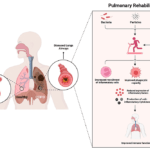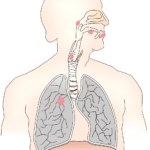
Are you wondering which medical conditions warrant enrollment in a pulmonary rehab program? Look no further, as we bring you all the essential information you need on the specific diagnoses that qualify individuals for pulmonary rehab. Understanding the criteria for pulmonary rehab eligibility will not only help you determine whether you or a loved one can benefit from this specialized treatment, but it will also empower you to make informed decisions regarding respiratory care. So, let’s delve into the world of pulmonary rehab qualifications and shed light on the conditions that open the door to this highly beneficial program.

Chronic Obstructive Pulmonary Disease (COPD)
Definition
Chronic Obstructive Pulmonary Disease (COPD) is a chronic lung disease that causes airflow obstruction, making it difficult to breathe. It is typically caused by long-term exposure to irritants such as cigarette smoke, air pollution, or occupational fumes. COPD includes conditions like emphysema and chronic bronchitis.
Qualification for Pulmonary Rehab
If you have been diagnosed with COPD, you may qualify for pulmonary rehabilitation. Pulmonary rehab is recommended for individuals with moderate to severe COPD who experience symptoms that significantly impact their daily life. This program is designed to help improve lung function, manage symptoms, and enhance overall quality of life.
Benefits of Pulmonary Rehab for COPD Patients
Pulmonary rehab offers a range of benefits for those living with COPD. First and foremost, it provides you with personalized exercise programs that are tailored to your specific needs and abilities. Through regular physical activity, you can improve your lung capacity, increase stamina, and enhance your ability to perform daily tasks without becoming breathless.
In addition to exercise, pulmonary rehab also focuses on education and support. You will receive guidance on breathing techniques, energy conservation, and strategies to manage your symptoms. This knowledge empowers you to take control of your condition and make informed decisions about your health.
Furthermore, pulmonary rehab helps to reduce hospitalizations and emergency room visits. By learning how to manage exacerbations and recognizing early warning signs, you can prevent or minimize the severity of flare-ups. The supportive environment of pulmonary rehab also fosters a sense of community and allows you to connect with others who are going through similar challenges.
Asthma
Definition
Asthma is a chronic respiratory condition characterized by inflammation and narrowing of the airways. Common symptoms include wheezing, coughing, chest tightness, and shortness of breath. Asthma can be triggered by various factors such as allergens, exercise, respiratory infections, or exposure to irritants.
Qualification for Pulmonary Rehab
Individuals with asthma may be eligible for pulmonary rehabilitation if they have persistent symptoms that impact their daily life and are not well controlled with medication alone. It is particularly beneficial for individuals with moderate to severe asthma who continue to experience limitations in their lung function and overall functioning.
Benefits of Pulmonary Rehab for Asthma Patients
Pulmonary rehabilitation can greatly benefit individuals with asthma by providing them with tools to better manage their condition. One of the key components of pulmonary rehab for asthma is education. You will learn about asthma triggers, medications, and techniques to effectively control your symptoms. This knowledge empowers you to make informed decisions and take proactive steps to prevent and manage asthma attacks.
Another crucial aspect of pulmonary rehab for asthma is exercise training. Through supervised exercise sessions, you will gradually build endurance, improve lung function, and reduce the frequency and severity of asthma symptoms. The exercises are designed to strengthen the respiratory muscles and make breathing easier, enabling you to lead a more active and fulfilling life.
Moreover, pulmonary rehab for asthma emphasizes the importance of self-monitoring and action plans. You will learn to recognize early warning signs of an asthma attack and take appropriate steps to prevent its progression. By understanding your condition and having a proactive approach, you can minimize the impact of asthma on your daily activities and reduce the need for urgent medical intervention.
Interstitial Lung Disease (ILD)
Definition
Interstitial Lung Disease (ILD) refers to a group of lung disorders that involve inflammation and scarring of the lung tissue. It affects the interstitium, which is the tissue that surrounds and supports the air sacs in the lungs. ILD can be caused by various factors including exposure to toxins, autoimmune diseases, certain medications, or unidentified causes.
Qualification for Pulmonary Rehab
If you have been diagnosed with Interstitial Lung Disease, pulmonary rehabilitation may be beneficial for you. Pulmonary rehab is typically recommended for individuals with moderate to severe ILD who experience symptoms such as shortness of breath, coughing, fatigue, and reduced exercise tolerance. It aims to improve lung function, enhance physical endurance, and optimize overall respiratory health.
Benefits of Pulmonary Rehab for ILD Patients
Pulmonary rehabilitation offers numerous advantages for individuals living with Interstitial Lung Disease. Firstly, it provides you with a structured exercise program tailored to your specific needs and limitations. By engaging in regular physical activity, you can increase your lung capacity, improve oxygen uptake, and enhance your ability to perform daily tasks without feeling excessively breathless.
In addition to exercise, pulmonary rehab for ILD emphasizes education and self-management techniques. You will receive valuable information about your condition, including strategies to conserve energy, breathing techniques to alleviate symptoms, and methods to manage exacerbations. This knowledge empowers you to actively participate in your treatment and make informed decisions about your health.
Furthermore, pulmonary rehab fosters psychological well-being by providing a supportive and inclusive environment. It allows you to connect with others who are facing similar challenges, providing a sense of camaraderie and understanding. This support network can be immensely helpful in coping with the emotional impact of living with Interstitial Lung Disease.
Cystic Fibrosis (CF)
Definition
Cystic Fibrosis (CF) is a genetic disorder that primarily affects the lungs and digestive system. It results in the production of thick and sticky mucus, obstructing the airways and leading to respiratory complications. CF can also affect the pancreas, liver, and intestines, impacting digestion and nutrient absorption.
Qualification for Pulmonary Rehab
Pulmonary rehabilitation can benefit individuals with Cystic Fibrosis who experience respiratory symptoms and challenges in daily life. It is typically recommended for those with moderate to severe CF who may have reduced lung function, frequent exacerbations, and difficulty performing physical activities.
Benefits of Pulmonary Rehab for CF Patients
Pulmonary rehabilitation plays a vital role in managing Cystic Fibrosis and improving overall respiratory health. One of the key components of pulmonary rehab for CF is exercise training. Through customized exercise programs, you can strengthen your respiratory muscles, enhance lung function, and increase your physical endurance. Regular exercise can help thin the mucus in your airways, making it easier to clear and reducing the risk of infections.
Additionally, pulmonary rehab focuses on education and self-management strategies. You will learn about airway clearance techniques, proper use of medications, and strategies to prevent respiratory infections. This knowledge equips you with the tools to effectively manage your condition, minimize complications, and maintain an optimal quality of life.
Furthermore, pulmonary rehab provides a supportive environment where you can connect with other individuals living with CF. This sense of community can be invaluable in navigating the challenges of the condition and provide emotional support. Sharing experiences, tips, and encouragement with others who understand your journey can make a significant difference in your overall well-being.

Lung Cancer
Definition
Lung cancer is a type of cancer that develops in the tissues of the lungs. It is usually caused by long-term exposure to tobacco smoke, but can also be triggered by other factors such as radon gas, asbestos, or genetic mutations. Lung cancer is one of the most common types of cancer worldwide and can cause significant respiratory symptoms.
Qualification for Pulmonary Rehab
Individuals with lung cancer who experience respiratory symptoms and have undergone treatment, such as surgery or radiation therapy, may qualify for pulmonary rehabilitation. Pulmonary rehab can help address the respiratory impact of lung cancer and improve overall physical functioning.
Benefits of Pulmonary Rehab for Lung Cancer Patients
Pulmonary rehabilitation offers numerous benefits for individuals living with lung cancer. One of the primary focuses of pulmonary rehab for lung cancer is exercise training. You will work with a team of healthcare professionals to develop an exercise program that suits your capabilities and goals. Regular exercise can improve lung function, increase stamina, and reduce fatigue, positively impacting your ability to perform daily activities and regain physical functionality.
In addition to exercise, pulmonary rehab also provides education and support. You will learn about breathing techniques, energy conservation strategies, and symptom management. This knowledge empowers you to regain control over your respiratory health, manage your symptoms more effectively, and optimize your overall quality of life.
Moreover, pulmonary rehab for lung cancer encourages psychological well-being by providing a supportive environment. The program allows you to connect with other individuals going through similar experiences, fostering a sense of community and understanding. Sharing your journey with others can provide emotional support and enhance your overall well-being.
Lung Transplant
Definition
A lung transplant is a surgical procedure that involves replacing a diseased or damaged lung with a healthy lung from a donor. Lung transplantation is typically considered for individuals with end-stage lung disease who have exhausted all other medical treatment options. It can be a life-saving procedure for those whose lung function is severely compromised.
Qualification for Pulmonary Rehab
Pulmonary rehabilitation is an essential component of the recovery process following a lung transplant. It is typically recommended for individuals who have undergone the procedure and are in the post-transplant phase. Pulmonary rehab helps optimize lung function, enhance physical stamina, and aid in the overall rehabilitation process.
Benefits of Pulmonary Rehab for Lung Transplant Patients
Pulmonary rehabilitation provides numerous benefits for individuals who have undergone a lung transplant. Firstly, it focuses on exercise training specifically tailored to post-transplant patients. Through progressive exercise programs, you can regain strength, improve lung function, and enhance your physical endurance. Regular exercise also helps prevent complications such as muscle weakness and deteriorating lung capacity.
Additionally, pulmonary rehab after lung transplant emphasizes education and support. You will learn about post-transplant care, including medication management, infection prevention, and signs of organ rejection. This knowledge equips you with the skills needed to maintain your new lung health and minimize the risk of complications.
Moreover, pulmonary rehab offers a supportive environment where you can share experiences and challenges with other individuals who have undergone lung transplantation. This sense of community can provide emotional support, encouragement, and a platform for guidance during the recovery journey. The support network established through pulmonary rehab can help you navigate the physical and emotional aspects of the post-transplant phase.

Pulmonary Hypertension
Definition
Pulmonary Hypertension is a condition characterized by high blood pressure in the arteries of the lungs. It occurs when the blood vessels in the lungs become narrowed, blocked, or damaged, leading to increased resistance and pressure. Pulmonary Hypertension can be caused by various factors, including underlying heart or lung diseases, genetic predisposition, or medication side effects.
Qualification for Pulmonary Rehab
Pulmonary rehabilitation is often recommended for individuals with Pulmonary Hypertension. It is especially beneficial for those who experience respiratory symptoms, reduced exercise capacity, and challenges in daily life due to the condition. Pulmonary rehab aims to improve lung function, enhance physical fitness, and optimize overall well-being.
Benefits of Pulmonary Rehab for Pulmonary Hypertension Patients
Pulmonary rehabilitation can significantly improve the lives of individuals living with Pulmonary Hypertension. One of the key components of pulmonary rehab for this condition is exercise training. Under the supervision of healthcare professionals, you will engage in tailored exercise programs that focus on improving cardiovascular endurance, enhancing lung function, and increasing overall physical fitness. Regular exercise can help alleviate symptoms, reduce fatigue, and improve your ability to perform daily activities.
Additionally, pulmonary rehab provides education and support to individuals with Pulmonary Hypertension. You will receive information about the condition, its progression, and strategies to manage symptoms and prevent complications. This knowledge empowers you to actively participate in your treatment, make necessary lifestyle modifications, and optimize your overall respiratory health.
Moreover, pulmonary rehab offers a supportive environment where you can connect with others facing similar challenges. This sense of community can provide emotional support, empathy, and an opportunity to share experiences. Being part of a support network can significantly impact your psychological well-being and help you navigate the challenges associated with Pulmonary Hypertension.
Chronic Bronchitis
Definition
Chronic Bronchitis is a long-term inflammation of the bronchial tubes, which carry air to and from the lungs. It is typically characterized by a persistent cough that produces excessive mucus, often lasting for at least three months and recurring for two consecutive years. Chronic Bronchitis is commonly caused by smoking or exposure to irritants such as air pollution or occupational fumes.
Qualification for Pulmonary Rehab
If you have been diagnosed with Chronic Bronchitis, pulmonary rehabilitation can greatly benefit you. Pulmonary rehab is recommended for individuals with moderate to severe Chronic Bronchitis who experience respiratory symptoms that affect their daily activities and overall quality of life.
Benefits of Pulmonary Rehab for Chronic Bronchitis Patients
Pulmonary rehabilitation offers numerous advantages for individuals living with Chronic Bronchitis. One of the key aspects of pulmonary rehab for this condition is exercise training. Through tailored exercise programs, you can improve lung function, increase physical stamina, and reduce breathlessness. Regular physical activity can also help improve your overall fitness and boost your immune system, reducing the risk of respiratory infections.
Additionally, pulmonary rehab focuses on education and self-management strategies. You will receive information about proper breathing techniques, effective coughing, and ways to manage exacerbations. This knowledge empowers you to take control of your condition and make necessary adjustments to your lifestyle to minimize symptoms and improve your quality of life.
Moreover, pulmonary rehab provides a supportive environment where you can connect with others living with Chronic Bronchitis. This sense of community can offer emotional support, understanding, and an opportunity to share experiences and coping strategies. By engaging with others, you can gain valuable insights, encouragement, and reassurance in your journey with Chronic Bronchitis.
Pulmonary Fibrosis
Definition
Pulmonary Fibrosis is a progressive lung disease characterized by the formation of scar tissue in the lungs. This scarring makes the lungs stiff and reduces their ability to expand and contract properly, leading to breathing difficulties. Pulmonary Fibrosis can be caused by factors such as exposure to environmental toxins, certain medications, autoimmune diseases, or idiopathic factors without a known cause.
Qualification for Pulmonary Rehab
Individuals with Pulmonary Fibrosis may qualify for pulmonary rehabilitation to manage their symptoms and improve their overall respiratory health. Pulmonary rehab is typically recommended for those with moderate to severe Pulmonary Fibrosis who experience respiratory symptoms that significantly impact their daily activities.
Benefits of Pulmonary Rehab for Pulmonary Fibrosis Patients
Pulmonary rehabilitation offers numerous benefits for individuals living with Pulmonary Fibrosis. One of the primary focuses of pulmonary rehab for this condition is exercise training. Through tailored exercise programs, you can improve lung function, increase physical endurance, and reduce breathlessness. Regular exercise can also help maintain muscle strength and prevent deconditioning, improving overall functional capacity.
In addition to exercise, pulmonary rehab provides education and support. You will receive information about breathing techniques, energy conservation, and strategies to manage symptoms. This knowledge empowers you to actively participate in your treatment, make necessary lifestyle modifications, and optimize your overall respiratory health.
Moreover, pulmonary rehab offers a supportive environment where you can connect with others who have Pulmonary Fibrosis. This sense of community can provide emotional support, empathy, and an opportunity to share experiences and coping strategies. Connecting with others who understand the challenges of living with Pulmonary Fibrosis can significantly impact your psychological well-being and enhance your overall quality of life.
Sarcoidosis
Definition
Sarcoidosis is a systemic inflammatory disease that can affect multiple organs, but most commonly involves the lungs. It is characterized by the formation of small clumps of inflamed cells called granulomas. The cause of Sarcoidosis is unknown, but it is believed to be an abnormal immune response. Respiratory symptoms can include coughing, shortness of breath, chest pain, and wheezing.
Qualification for Pulmonary Rehab
Pulmonary rehabilitation can be beneficial for individuals with Sarcoidosis, particularly those who experience respiratory symptoms and limitations in daily life. It is typically recommended for individuals with moderate to severe Sarcoidosis to improve lung function, manage symptoms, and enhance overall quality of life.
Benefits of Pulmonary Rehab for Sarcoidosis Patients
Pulmonary rehabilitation offers several advantages for individuals living with Sarcoidosis. One of the key components of pulmonary rehab for this condition is exercise training. Through personalized exercise programs, you can improve lung function, increase physical endurance, and reduce breathlessness. Regular exercise also helps improve overall fitness and can enhance your ability to perform daily activities without excessive fatigue.
Additionally, pulmonary rehab focuses on education and self-management strategies. You will receive information about breathing techniques, energy conservation, and methods to manage symptoms and exacerbations. This knowledge empowers you to actively participate in your treatment, make necessary lifestyle modifications, and optimize your overall respiratory health.
Moreover, pulmonary rehab provides a supportive environment where you can connect with others facing similar challenges with Sarcoidosis. This sense of community can provide emotional support, empathy, and an opportunity to share experiences and coping strategies. Building connections with others who understand the impact of Sarcoidosis can significantly enhance your overall well-being and sense of belonging.









